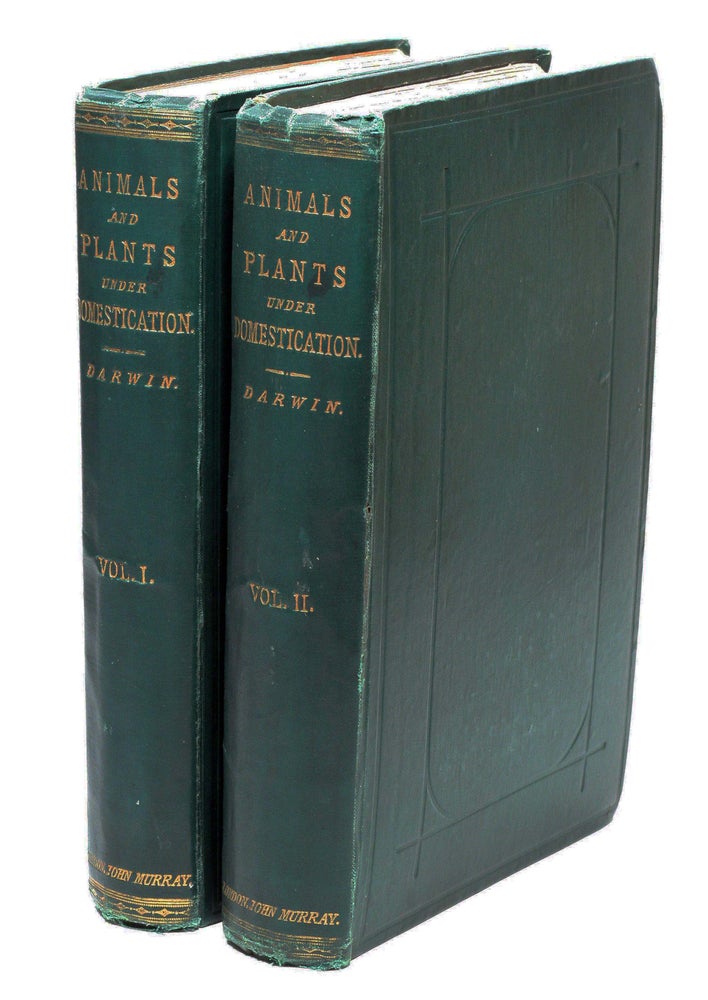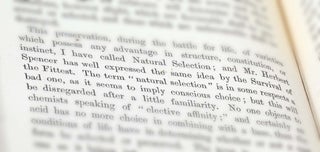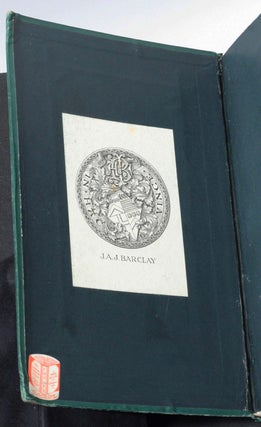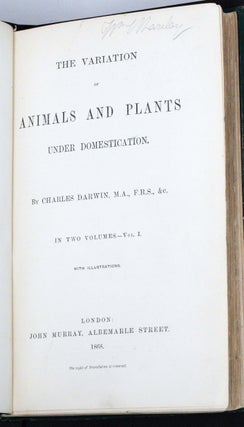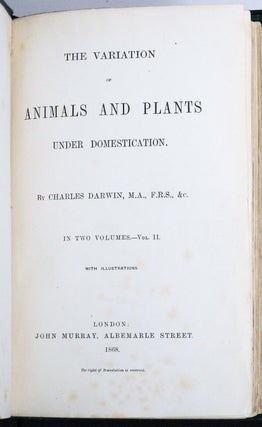The Variation of Animals and Plants under Domestication
"This preservation, during the battle for life, of varieties which possess any advantage in structure, constitution, or instinct, I have called Natural Selection; and Mr. Herbert Spencer has well expressed the same idea by the Survival of the Fittest. The term "natural selection" is in some respects a bad one, as it seems to imply conscious choice; but this will be disregarded after a little familiarity.” - Darwin, page 6 of Variations
FIRST EDITION, FIRST ISSUE IN ORIGINAL CLOTH of Darwin’s sequel to the Origin of Species, including his first use of the term “survival of the fittest”.
“The Variation was a full statement of the facts on which the theories of the Origin were based...
“After the Origin's publication Darwin embarked on two broad lines of research: botanical experiments, and studies of variation, sexual selection, and emotional expressions in humans and mammals. In 1860 he began recycling the early, as yet unpublished, chapters of ‘Natural selection’ and studying the osteology of domestic pigeons, ducks, and geese for a book on how breeders and horticulturists modify species. This was The Variation of Animals and Plants under Domestication (1868)... Its two volumes were intended to provide overwhelming evidence for the ubiquity of variation, although they would also incidentally answer Lyell and Gray, who maintained that variations had not occurred purely by chance but were providentially directed. Darwin showed that breeders indeed selected from a vast array of minute random variations. He gave numerous instances of the causes of variability, including the direct effect of the conditions of life, reversion, the effects of use and disuse, saltation, prepotency, and correlated growth.
“The Variation also addressed a key criticism of the Origin of Species: that it lacked an adequate understanding of inheritance. Darwin's ‘provisional hypothesis of pangenesis’ was constructed to explain how heritable traits were passed from parents to offspring. He supposed that each part of a parent organism throws off minute particles, or ‘gemmules’, which circulate in the body and collect in the sexual organs to be transmitted in reproduction. Because gemmules are received from two parents, the offspring develop to resemble them both more or less. ‘The child, strictly speaking, does not grow into the man, but includes germs which slowly and successively become developed and form the man’ (Darwin, Variation).
“The term ‘survival of the fittest’ (borrowed at Wallace's insistence from Herbert Spencer's 1866 Principles of Biology) first appeared in the Variation... It was a partial substitute for Darwin's more anthropomorphic ‘natural selection’, which many critics took to imply the existence of a ‘selector’. Mistaking Darwin's metaphor, they concluded that intelligence lay as much behind nature's selecting as behind a pigeon fancier's. Nevertheless Darwin defended his use of ‘natural selection’ while conceding that he had personified it too much” (Dictionary of National Biography).
First issue: with 1-line publisher’s imprint on cloth at base of spines, 5 lines of errata in vol. I and 7 in vol. II.
Complete with 32 pages of ads dated April 1867 at rear of vol. I, 2 pages of ads dated February 1868 at rear of vol. II (as issued) and 43 in-text wood engravings.
London: John Murray, 1868. Octavo, original cloth. Two volumes. Handsome bookplate and small bookseller's (Foyle's) sticker on front pastedown of each volume and neat owner signature in pencil on flyleaves. A little foxing to flyleaf and title of volume 2, otherwise text generally clean. Cloth with only a little rubbing and a few mild spots of soiling. Volume 1 possibly recased (spine cloth tight against text block). Spine gilt exceptionally bright. A handsome copy in original cloth of an essential Darwin text.
Price: $4,200 .


